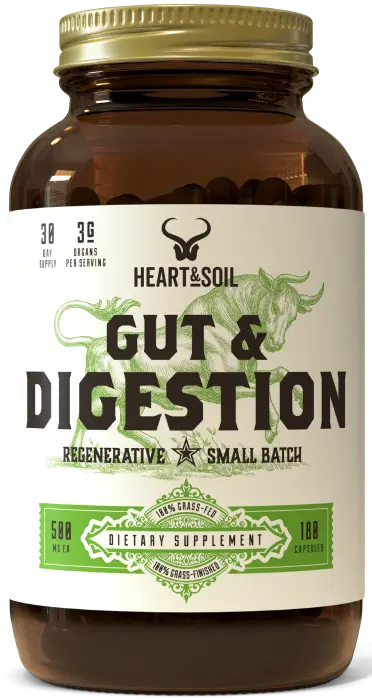PLEASE NOTE: The information in this blog is for educational purposes only. It is not a substitute for professional medical advice. Consult your healthcare provider if you’re seeking medical advice, diagnoses, or treatment.
While the human body is resilient, it’s also delicate. Digestive, reproductive, and cognitive functions can easily be thrown off. Hormonal health is no exception.
Modern diet, environmental, and lifestyle choices can quickly cause disruption. The average person is now exposed to an onslaught of potential irritants through food, water, environmental toxins, and household products (to name a few)(1).
Imbalanced hormones can lead to a barrage of unpleasant symptoms and more profound challenges.
In this article, we’ll explore general principles surrounding hormone imbalances, focusing on estrogen dominance. You’ll learn:
- What are hormones?
- The basics & common causes of hormonal imbalance.
- Potential pitfalls of birth control.
- Strategies to protect or recover your hormonal health.
Off we go!
Why Are Hormones Important?
Hormones are messengers that travel through the bloodstream to organs and tissues. They impact your mood, metabolism, sexual function, and reproduction (2). These hormones are created and secreted by glands such as the thyroid, pancreas, ovaries, testes, and adrenals. Your liver, kidneys, gut, and fat tissue can also release hormones.
There are many types of hormones, but estrogen, progesterone, and testosterone tend to get the most attention.
Estrogen is required for both men’s and women’s bone, cardiovascular, and reproductive health. However, women have larger amounts of it. Estrogen levels fluctuate throughout a woman’s life but should do so in conjunction with other hormones.
The body creates three types of estrogen: Estrone (E1), Estradiol (E2), and Estriol (E3).
Progesterone helps to promote ovulation, regulate the menstrual cycle, and prepare the body for pregnancy. Men and women both need progesterone to help balance estrogen.
After menopause, the ovaries no longer make progesterone, but it’s produced elsewhere in the body.
Testosterone is a sex hormone that impacts our bones and muscles, libido, and the development of male traits. It’s often associated with male health, but it’s also crucial for female hormonal health.
Women may experience a decrease in testosterone following menopause, and men can see levels decline at about 1-2% per year (3). As with anything, too much or too little of a particular hormone can lead to complications.
What is Hormonal Imbalance?
Hormonal imbalance can occur in both men and women and is characterized by too much or too little of one or multiple hormones.
One of the most common forms of imbalance is called estrogen dominance. This occurs when the balance between estrogen and progesterone is altered. So, this does not mean it’s solely related to excessive estrogen.
Estrogen levels fluctuate during a woman’s life, but estrogen dominance can throw off cycles and reproductive health.
Thyroid challenges such as Hashimoto’s Thyroiditis and hyperthyroidism are also connected to hormonal imbalances, as well as high or low testosterone levels and adrenal fatigue.
These challenges commonly result in symptoms like low libido, painful or irregular periods, irritability, recurring infections, sleep difficulties, and weight gain. For men, excess estrogen can lead to infertility or erectile dysfunction.

Many hormonal imbalances are treated conventionally with birth control, which can have multiple side effects (more on this below).
Long-term hormonal imbalances like estrogen dominance can increase your risk of type 2 diabetes, heart disease, and certain types of cancer. It can also contribute to challenges like infertility or PCOS.
Working with a medical professional to identify and treat underlying hormonal imbalances is essential!
What Causes Hormonal Imbalance?
Various factors such as stress, medications, medical conditions, diet, a sedentary lifestyle, and environmental triggers may contribute to altered hormone levels (4). Genetics, gut dysbiosis, and metabolic dysfunction can also impact hormone levels. Even excess body fat can increase estrogen levels.

Gut, liver, and thyroid health are important when addressing hormonal imbalance. As mentioned above, each of these areas releases hormones.
Gut dysbiosis or impaired liver function can lead to complications with estrogen detoxification. Gut issues are typically a major stressor that may lead to excess stress hormone production. Estrogen is eliminated through the stool, so constipation or other digestive issues can contribute to hormonal imbalances.
Thyroid hormones are involved in the activity and production of sex hormones. Excess estrogen can even bind to and interfere with thyroid hormone synthesis. Thyroid challenges like Hashimoto’s or Hyperthyroidism often have a hormonal imbalance component.
Your liver is crucial for detoxification. The liver can help package up excess estrogen before its eliminated. So, if your liver isn’t functioning optimally, it may contribute to elevated estrogen levels.
The Role of Birth Control
Another contributor to hormonal imbalances is birth control, the most commonly used contraceptive in the United States.

While these contraceptives can help with acne or irregular periods, they have various risks. Symptoms like acne are also generally an indication from your body that something is out of balance. Birth control can remove some of these symptoms, but the root cause may not be addressed.
These pills can contribute to hypertension, stroke, blood clots, gallbladder disease, and certain cancers (5, 6, 7). It may also contribute to nutrient deficiencies that can impact the function of your gut, liver, and thyroid (8).
While the decision to take birth control is ultimately between you and your medical provider, it’s important to be aware that these contraceptives can have consequences for your health, and there may be options better suited to your needs.

7 Simple Strategies to Improve Your Hormonal Health
We believe you can best optimize hormonal health by focusing on the key factors described below.
1. Eat A Nutrient Rich Diet
This may look different for everyone, but we suggest an animal-based diet. The animal-based diet prioritizes well-raised animal foods like meat, organs, raw dairy, and eggs, along with low-toxicity carbohydrates.
These are some of the most nourishing foods on the planet, and you can get nearly every vitamin and mineral you need to perform your best daily. Unsurprisingly, these foods support hormonal health.
While meat, dairy, and eggs often get a bad wrap for their fat content, fat is crucial for cholesterol production. Cholesterol is a building block for hormones. Eating foods high in vitamin B6 and zinc can help with progesterone synthesis (9, 10). Nutrients like vitamin K, zinc, selenium, calcium, and iron may even help reduce the symptoms of estrogen dominance (11, 12, 13). Each of these is readily available in numerous animal foods.
Real Organ Nutrition for Men
Strength. Drive. Testosterone.
Nourish Your Female Health
Hormonal Balance & Reproductive Health
2. Remove Highly Processed Foods
A diet high in unprocessed foods can place unnecessary stress on your body. In particular, we suggest avoiding processed sugars, seed oils, and artificial sweeteners.
Processed vegetable oils (corn, safflower, sunflower, soybean, cottonseed, canola, peanut, grapeseed, sesame, etc.) contain a polyunsaturated omega-6 fatty acid called linoleic acid. It can initiate a damaging “cycle of oxidation, insulin resistance, and inflammation that perpetuates metabolic and inflammatory diseases….”(14).
Because of these harmful effects, we suggest replacing seed oils with nourishing saturated fats like tallow, ghee, and butter.
When looking to optimize hormonal health, it can also be helpful to eliminate (or reduce) alcoholic beverages, as these are known to cause high estrogen (15).
3. Limit Your Exposure to Xenoestrogens
Xenoestrogens are chemicals that can mimic estrogens within your body (16). They can contribute to hormonal imbalances such as estrogen dominance (17).
Xenoestrogens are found in plastics, pesticides, tap water, cleaning products, sunscreen, and other products. Exposure to xenoestrogens may disrupt hormone function, especially during pregnancy, childhood, and other critical periods (18).

You’ve likely seen labels that say “BPA-free.” Bisphenol A (BPA) is a chemical commonly used in toys, cosmetics, receipts, and food can lining. It’s a xenoestrogen that’s easily transferred to food and water. Unsurprisingly, BPA can have adverse effects on hormones (19).
Phthalates are another common endocrine disruptor in plastics and personal care products (20, 21). These can easily leach into food and water and build up in the environment.
Thankfully, phthalates and other xenoestrogens can exit the body quickly (22). So, simple changes to everyday items can have an immediate impact.
Cutting down on these chemicals can be as simple as using stainless steel water bottles, minimizing canned food intake, avoiding plastic containers, avoiding non-stick pans, and using glass for food storage.
Consider incorporating personal care products made with tallow, coconut oil, olive oil, or other natural ingredients. Limiting fragrances as much as possible can also decrease exposure to chemical inputs. This website is an excellent resource for finding cleaner personal care products. Chem Trust also has helpful insight on this topic.
4. Improve Your Gut Health
As mentioned above, gut health and hormonal health are closely related.
The road to improved gut health looks different for everyone, but diet and lifestyle habits are crucial. This looks like including nutrient-dense foods, eliminating processed foods, reducing stress, exercising, and getting restful sleep.
When the gut is compromised, this may result in inadequate absorption of nutrients (iodine, selenium, etc.) needed for proper thyroid function (23).
Nourish Your Gut
Grass-Fed Organs for Digestive Wellness
5. Rest, Recover and Reduce Stress
Stress and fatigue can cause or exacerbate inflammation (24). Stress can also deplete your body’s ability to produce progesterone, so it’s essential to:
- Prioritize a consistent sleep routine of at least 7-8 hours per night.
- Exercise and incorporate daily movement, but avoid overtraining, as excessive exercise can elevate cortisol levels and harm thyroid function (25). Exercise can lead to increased detoxification through sweating as well as reduce estrogen levels (26)
- Engage in activities that promote relaxation, such as sunbathing, spending time with loved ones, and pursuing hobbies.
6. Improve Your Environmental Health
While diet and lifestyle practices receive much attention, your environment can dramatically impact your health.
Exposure to environmental toxins, such as certain chemicals, pollutants, or heavy metals, can trigger hormonal issues (27,28). To help offset the effects:
- Use air and water filters in your home.
- Choose natural cleaning and personal care products, glass and stainless steel, and clothing and bedding made from organic cotton, hemp, wool, or bamboo, free from parabens and synthetic fibers (29). Check out Dr. Paul’s video on environmental toxins for more info.
- Choose organic produce.
- Engage in regular detoxification practices such as exercise and sauna sessions.
7. Identify Root Causes
You may want to work with a professional if you’re already consistent with your diet and lifestyle but are still experiencing significant challenges.
Providers can run urine or stool tests to dig deeper into any root causes, such as heavy metals, mold, parasites, Lyme disease, and other environmental toxins. These are incredibly common today, yet they can fly under the radar!
If needed, check out the Society of Metabolic Health Practitioners, where you can find physicians from all around the globe who understand the immense value of making animal foods the center of the diet. Another popular option is IFM Find a Practitioner for a functional medicine approach.
These professionals can also help you assess the function of your gut, liver, and thyroid.
Balance Your Hormones Naturally
If your hormones are out of whack, likely, other areas are as well. Hormonal imbalances can indicate that your diet and lifestyle habits need a change or that more profound challenges are present.
Simple diet and lifestyle changes can dramatically improve your hormonal health. This can look like prioritizing nutrient-dense foods, cutting out processed foods, and limiting exposure to xenoestrogens. As with any health journey, sleep, sunlight, and stress management are vital.
Working with a medical professional can also offer valuable insight into the potential root causes of your hormonal imbalance.
Proper hormonal health is crucial for your energy levels, libido, and much more!
Subscribe to future articles like this:


